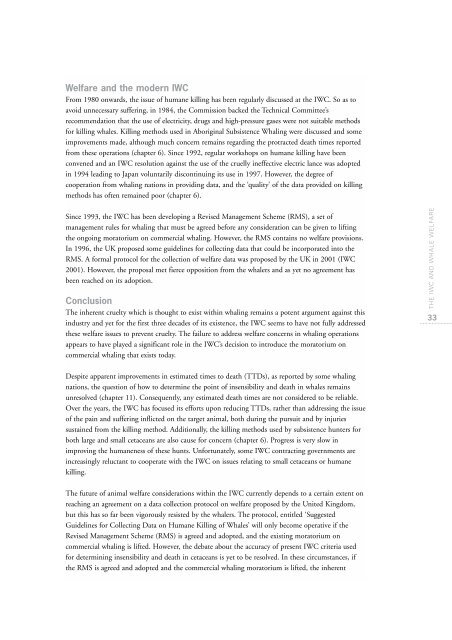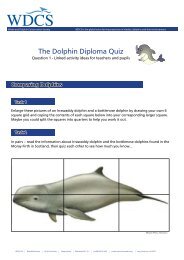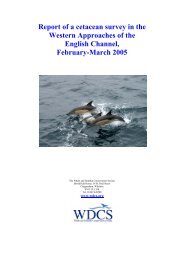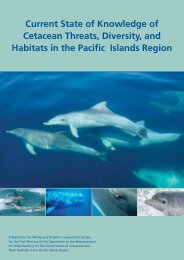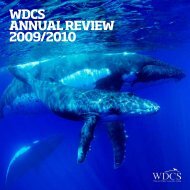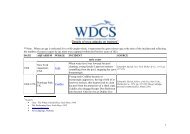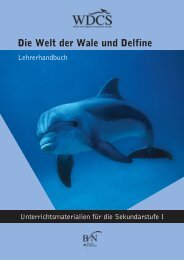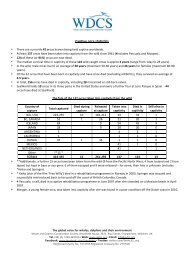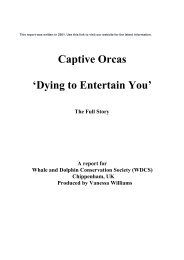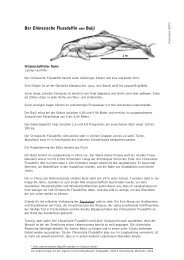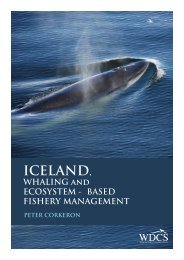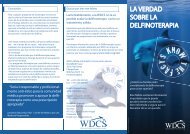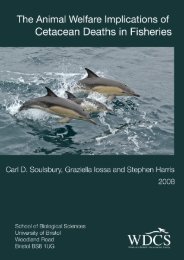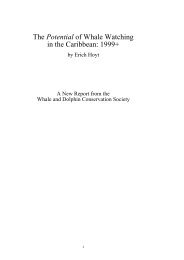TROUBLED WATERS - Whale and Dolphin Conservation Society
TROUBLED WATERS - Whale and Dolphin Conservation Society
TROUBLED WATERS - Whale and Dolphin Conservation Society
Create successful ePaper yourself
Turn your PDF publications into a flip-book with our unique Google optimized e-Paper software.
Welfare <strong>and</strong> the modern IWC<br />
From 1980 onwards, the issue of humane killing has been regularly discussed at the IWC. So as to<br />
avoid unnecessary suffering, in 1984, the Commission backed the Technical Committee’s<br />
recommendation that the use of electricity, drugs <strong>and</strong> high-pressure gases were not suitable methods<br />
for killing whales. Killing methods used in Aboriginal Subsistence Whaling were discussed <strong>and</strong> some<br />
improvements made, although much concern remains regarding the protracted death times reported<br />
from these operations (chapter 6). Since 1992, regular workshops on humane killing have been<br />
convened <strong>and</strong> an IWC resolution against the use of the cruelly ineffective electric lance was adopted<br />
in 1994 leading to Japan voluntarily discontinuing its use in 1997. However, the degree of<br />
cooperation from whaling nations in providing data, <strong>and</strong> the ‘quality’ of the data provided on killing<br />
methods has often remained poor (chapter 6).<br />
Since 1993, the IWC has been developing a Revised Management Scheme (RMS), a set of<br />
management rules for whaling that must be agreed before any consideration can be given to lifting<br />
the ongoing moratorium on commercial whaling. However, the RMS contains no welfare provisions.<br />
In 1996, the UK proposed some guidelines for collecting data that could be incorporated into the<br />
RMS. A formal protocol for the collection of welfare data was proposed by the UK in 2001 (IWC<br />
2001). However, the proposal met fierce opposition from the whalers <strong>and</strong> as yet no agreement has<br />
been reached on its adoption.<br />
Conclusion<br />
The inherent cruelty which is thought to exist within whaling remains a potent argument against this<br />
industry <strong>and</strong> yet for the first three decades of its existence, the IWC seems to have not fully addressed<br />
these welfare issues to prevent cruelty. The failure to address welfare concerns in whaling operations<br />
appears to have played a significant role in the IWC’s decision to introduce the moratorium on<br />
commercial whaling that exists today.<br />
Despite apparent improvements in estimated times to death (TTDs), as reported by some whaling<br />
nations, the question of how to determine the point of insensibility <strong>and</strong> death in whales remains<br />
unresolved (chapter 11). Consequently, any estimated death times are not considered to be reliable.<br />
Over the years, the IWC has focused its efforts upon reducing TTDs, rather than addressing the issue<br />
of the pain <strong>and</strong> suffering inflicted on the target animal, both during the pursuit <strong>and</strong> by injuries<br />
sustained from the killing method. Additionally, the killing methods used by subsistence hunters for<br />
both large <strong>and</strong> small cetaceans are also cause for concern (chapter 6). Progress is very slow in<br />
improving the humaneness of these hunts. Unfortunately, some IWC contracting governments are<br />
increasingly reluctant to cooperate with the IWC on issues relating to small cetaceans or humane<br />
killing.<br />
The future of animal welfare considerations within the IWC currently depends to a certain extent on<br />
reaching an agreement on a data collection protocol on welfare proposed by the United Kingdom,<br />
but this has so far been vigorously resisted by the whalers. The protocol, entitled ‘Suggested<br />
Guidelines for Collecting Data on Humane Killing of <strong>Whale</strong>s’ will only become operative if the<br />
Revised Management Scheme (RMS) is agreed <strong>and</strong> adopted, <strong>and</strong> the existing moratorium on<br />
commercial whaling is lifted. However, the debate about the accuracy of present IWC criteria used<br />
for determining insensibility <strong>and</strong> death in cetaceans is yet to be resolved. In these circumstances, if<br />
the RMS is agreed <strong>and</strong> adopted <strong>and</strong> the commercial whaling moratorium is lifted, the inherent<br />
THE IWC AND WHALE WELFARE<br />
33


